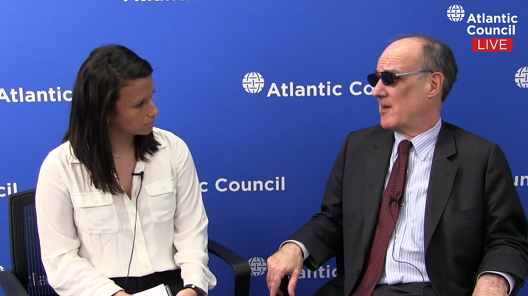 Former US Special Envoy to Libya, Ambassador Jonathan Winer spoke at a panel event on Libya at the Rafik Hariri Center on March 9, 2016 and gave a short interview afterwards describing the priorities for ending the Libyan crisis. Below is a summary of his comments and the Facebook Live interview.
Former US Special Envoy to Libya, Ambassador Jonathan Winer spoke at a panel event on Libya at the Rafik Hariri Center on March 9, 2016 and gave a short interview afterwards describing the priorities for ending the Libyan crisis. Below is a summary of his comments and the Facebook Live interview.
If the conflict in Libya is to be resolved, key actors to the conflict—including Field Marshall Khalifa Haftar, Prime Minister Fayez al-Serraj of the Government of National Accord, and Speaker of the House of Representatives Aguila Saleh—should negotiate a deal to stabilize the country, former US Special Envoy to Libya, Ambassador Jonathan Winer said Thursday. He also called on the United States to engage in efforts to reach a negotiated settlement and stabilize Libya. Key to Libya’s stability is its oil sector, and the recent conflict in the country is once again threatening to weaken it.
“Oil is Libya’s life blood,” Winer said. While oil production in Libya reached 700,000 barrels per day (bpd) of oil in January – the country has the capacity to pump 1.5 to 1.6 million bpd – output was as low as 250,000 bpd in 2016, Winer explains. “All the oil had been shut down by one party or another trying to get some advantage over somebody else,” he stated.
This is not the first time clashes, which threaten to halt oil production, have occurred surrounding Es Sider and Ras Lanuf oil ports and terminals. In 2016, Commander of the Petroleum Facilities Guards Ibrahim Jadran seized control of Es Sider and Ras Lanuf.
“Jadran shut down some 600,000 bpd altogether as he was trying to get money out of the Government of National Accord,” Winer said. “He promised to turn it [production] back on and never did.” In September 2016, Haftar’s Libyan National Army pushed Jadran out of the ports. As a result, exports increased from 300,000 bpd to approximately 700,000 bpd.
Winer welcomed Haftar’s decision to hand oil production over to the National Oil Corporation following his seizing of the ports, but added that action set a dangerous precedent. “You can gain some political power, by an exercise in military power related to oil.”
“What we’re seeing now,” Winer explained, “is Haftar’s enemies, the Benghazi Defense Brigade, and maybe some of the people associated with Jadran going back in and retaking Ras Lanuf and Es Sider to say ‘We’re the ones who are now protecting the oil.’”
While in practical terms, it does not matter who is protecting the oil as long as production continues, Winer said, it carries political significance and poses a potential risk to infrastructure.
Competing international and regional interests have also served to perpetuate instability in Libya. “When you had Qatar and Turkey supporting people in the West, and Egypt and Saudi and the UAE supporting people in the East, you had a grave risk of people getting armed and winding up in civil war with one another,” Winer said.
After international and regional actors reached a consensus that civil conflict in the country was “not only bad for Libya, but bad for everyone involved,” Winer says that they began to align, resulting in the Skhirat Agreement signed in Morocco in December 2015. The agreement between warring factions, facilitated by the UN, established the Government of National Accord and created a Presidential Council and High Council of State.
Recognizing that the agreement has not been upheld by all parties and that some argue it did not go far enough in deconflicting competing interests in Libya, Winer was nonetheless encouraged from efforts by Algeria, Egypt, and Tunisia to bring Haftar, al-Serraj, and Saleh to the negotiating table.
“Continued efforts to get people to align with one another in support of a common approach is essential for Libya’s future,” Winer said, adding that the United States should be actively involved in this effort.
Winer also underlined the US role in counterterrorism efforts in Libya in particular. Under the Obama administration, the United States worked with the Libyan government to push the Islamic State (ISIS) out of the city of Sirte. While ISIS no longer controls territory in Libya, Winer notes that “there still are ISIS, al-Qaeda in the Maghreb, Ansar al-Sharia, al-Mourabitoun cells in Libya; so the counterterrorism work is not done.”
He said that the United States should work with other countries “as appropriate,” such as the United Kingdom, France, and Italy. Additionally, the US should address the residual terrorist threat in Libya, with the permission of the Libyan government, and prevent further attacks in the country or attacks aimed at its neighbors. Winer also underlined the need for the United States to communicate with UN Security Council members Russia and China on this front. These efforts, he said, are important in order to help strengthen and stabilize Libya’s Government of National Accord.
Emily Burchfield is an intern at the Atlantic Council’s Rafik Hariri For the Middle East.
Image: Photo: Still from Facebook Live interview at the Atlantic Council.
